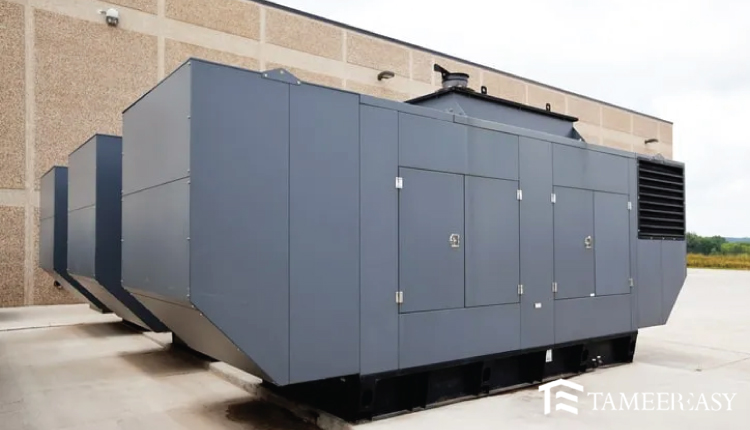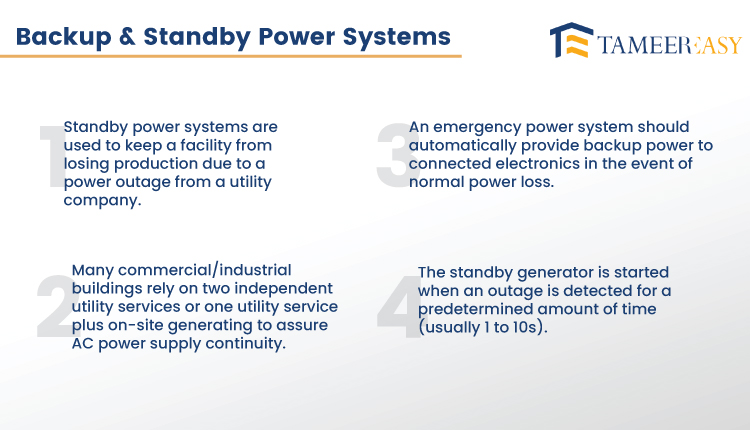Any house can be strong and beautiful, but if it lacks the best electrical system or a backup power system that cannot be used in the event of a power outage, the beauty and strength of the house are useless.
Visit TameerEasy Store to Purchase Quality Construction Items
The electrical system that can control the house’s load, offer backup power, or function with its standby power automatics is the finest one. The most crucial factor is the backup, standby power system—a UPS, generator, or solar system for your home.
Everyone is aware of UPSs and generators, but to ensure a longer system life, it’s crucial to understand which UPS will be appropriate based on your load. We’ll go through the fundamentals of these inquiries so that you can upgrade your home’s electrical system and create a reliable backup and standby power system.

Difference Between Standby Power and Backup Power
Backup power systems is always available electricity, whereas standby power is the power available after a delay or disturbance.
What is Backup Power System
When there is sunlight, a UPS or solar power system are the two types of backup power systems used most frequently. When examining its parts, it has a backup battery system, an AC/DC inverter, Wiring and conduiting, grounding, and more. Three other backup power system types are available online, offline, and line interactive.
What is Standby Power System
The standby power system is a backup method that uses a generator or a secondary primary power source if the main power source is interrupted. We refer to this as a backup power system.
Choosing the Best UPS for a House
We will outline two to three critical points for you:
The first step is deciding the UPS to install based on the customer’s needs. It considers cost, main power failure protection, and power quality. In the international standard, it can be classified into three major classes, though:
- VFI
- VFD
- VI
It is essential for you to be aware of this; therefore, it has been discussed. A specialist chooses the type of UPS based on the customer’s needs.


UPS Installation
- A professional should always install it if we’re talking about it.
- Consider installing a different UPS on each floor while considering the load on each floor.
- Although a UPS with a single battery works well, a UPS with dual or more batteries can also be installed in case of a higher load.
- Make sure that the system’s batteries are all from the same manufacturer, though, in this instance. The system’s lifespan could be shortened if they are from different companies.
Wiring of UPS
- Ensure that the UPS’s wiring is entirely distinct. If the house is big, it is preferable to have a separate DB.
- Additionally, ensure that the switch sockets on your UPS are only used for specific loads like TV, computer, laptop, or mobile charging.
- Because the crest factor increases when additional loads, like a stove, oven, or other domestic appliances, are connected to these switch sockets, the UPS components and other loads, such as lights, fans, and their dimmers, may be damaged.
Benefits of Installing a UPS
Although UPS offers many advantages, as you are aware, we would like to highlight four in particular:
- Your computer, Wi-Fi, security system, and other specific loads receive uninterrupted power from UPS, protecting your data and maintaining internet connectivity. The security system continues to operate even in cases of power outages.
- Your grid or generator supply is filtered and stabilised by a harmonic filter used by UPS to provide you with high-quality power.
- In the event of a primary supply outage or fluctuation, it offers independent power control to ensure the safety of all connected loads.
- It offers a redundant or parallel system to reduce the likelihood of system failure.
Overview of Generators
Different Generator Types
Regarding its varieties, gas, petrol, and diesel generators are typically used for domestic purposes.
Benefits of Having a Generator in Your Home
The main benefit of a generator is the ability to provide electricity manually or through an automated transfer switch (ATS) in the event of a power loss, for prolonged load shedding, or in unique circumstances like events or locations where there is no central power supply.
Negative Aspects of Generators
However, it has some drawbacks, including harmonic distortion, fluctuation, noise pollution, maintenance costs, and highly flammable fuel.
Final Thoughts
We hope you understand the need for backup power systems. Visit our website at tameereasy if you still need further help with installation, any other problem, or any queries.







